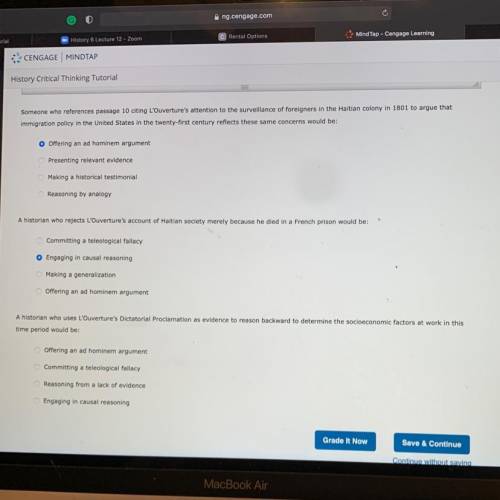
History, 21.01.2021 14:40 mkpayton2006
Someone who references passage 10 citing L'Ouverture's attention to the surveillance of foreigners in the Haitian colony in 1801 to argue that
immigration policy in the United States in the twenty-first century reflects these same concerns would be:
o Offering an ad hominem argument
Presenting relevant evidence
Making a historical testimonial
Reasoning by analogy
A historian who rejects L'Ouverture's account of Haitian society merely because he died in a French prison would be:
Committing a teleological fallacy
Engaging in causal reasoning
Making a generalization
Offering an ad hominem argument
A historian who uses L'Ouverture's Dictatorial Proclamation as evidence to reason backward to determine the socioeconomic factors at work in this
time period would be:
Offering an ad hominem argument
Committing a teleological fallacy
Reasoning from a lack of evidence
Engaging in causal reasoning


Answers: 2


Another question on History

History, 21.06.2019 19:30
In the decision for dred scott vs.sanford, (1857) in which a slave petitioned for his freedom in a st. louis court, on the grounds that his owner had taken him into free territory, and thus he ought no longer be regarded as possessing "slave" status, but should be regarded as a free man, the court decided as follows (excerpt): "in the circuit courts of the united states, the record must show that the case is one in which by the constitution and laws of the united states, the court had jurisdiction--and if this does not appear, and the court gives judgment either for plaintiff or defendant, it is error, and the judgment must be reversed by this court--and the parties cannot by consent waive the objection to the jurisdiction of the circuit court. a free negro of the african race, whose ancestors were brought to this country and sold as slaves, is not a 'citizen' within the meaning of the constitution of the united states. when the constitution was adopted, they were not regarded in any of the states as members of the community which constituted the state, and were not numbered among its 'people or citizen.' consequently, the special rights and immunities guarantied to citizens do not apply to them. and not being "citizens" within the meaning of the constitution, they are not entitled to sue in that character in a court of the united states, and the circuit court has not jurisdiction in such a suit. the only two clauses in the constitution which point to this race, treat them as persons whom it was morally lawful to deal in as articles of property and to hold as slaves. since the adoption of the constitution of the united states, no state can by any subsequent law make a foreigner or any other description of persons citizens of the united states, nor entitle them to the rights and privileges secured to citizens by that instrument." why does the court say that the petitioning party in this case had no right to sue for his freedom? a) because he is too young b) because he is from a different state c) because he is "of the african race" with enslaved ancestors d) because he is, properly speaking, within his owner's jurisdiction
Answers: 1

History, 22.06.2019 01:00
In what way did expansion and global trade during the 15th to 18th centuries affect the economies of european countries?
Answers: 2

History, 22.06.2019 06:30
Be a 100% sureduring the summer of 1943, anne eagerly recounts how an enemy country drops out of the war. which country is it? a.italyb.germanyc.spainfyi: this is a question based on the story anne frank
Answers: 1

History, 22.06.2019 07:00
Pls me! the black codes were various state laws in the south concerning african-americans which of the following statements about the black codes is not accurate. a. the black codes protected the civil rights of african-americans. b. african americans who cannot afford to pay a fine could be jailed and then be hired out to anyway person who could pay the fine. c. some southern states passed laws that prohibited is african-americans from voting or serving on jury‘s. d. the black codes were designed to force african-americans into a condition of near slavery.
Answers: 2
You know the right answer?
Someone who references passage 10 citing L'Ouverture's attention to the surveillance of foreigners i...
Questions



Mathematics, 04.02.2021 19:50

History, 04.02.2021 19:50

English, 04.02.2021 19:50


Mathematics, 04.02.2021 19:50


Geography, 04.02.2021 19:50



Mathematics, 04.02.2021 19:50



Mathematics, 04.02.2021 19:50

Mathematics, 04.02.2021 19:50


English, 04.02.2021 19:50

Mathematics, 04.02.2021 19:50

Social Studies, 04.02.2021 19:50



